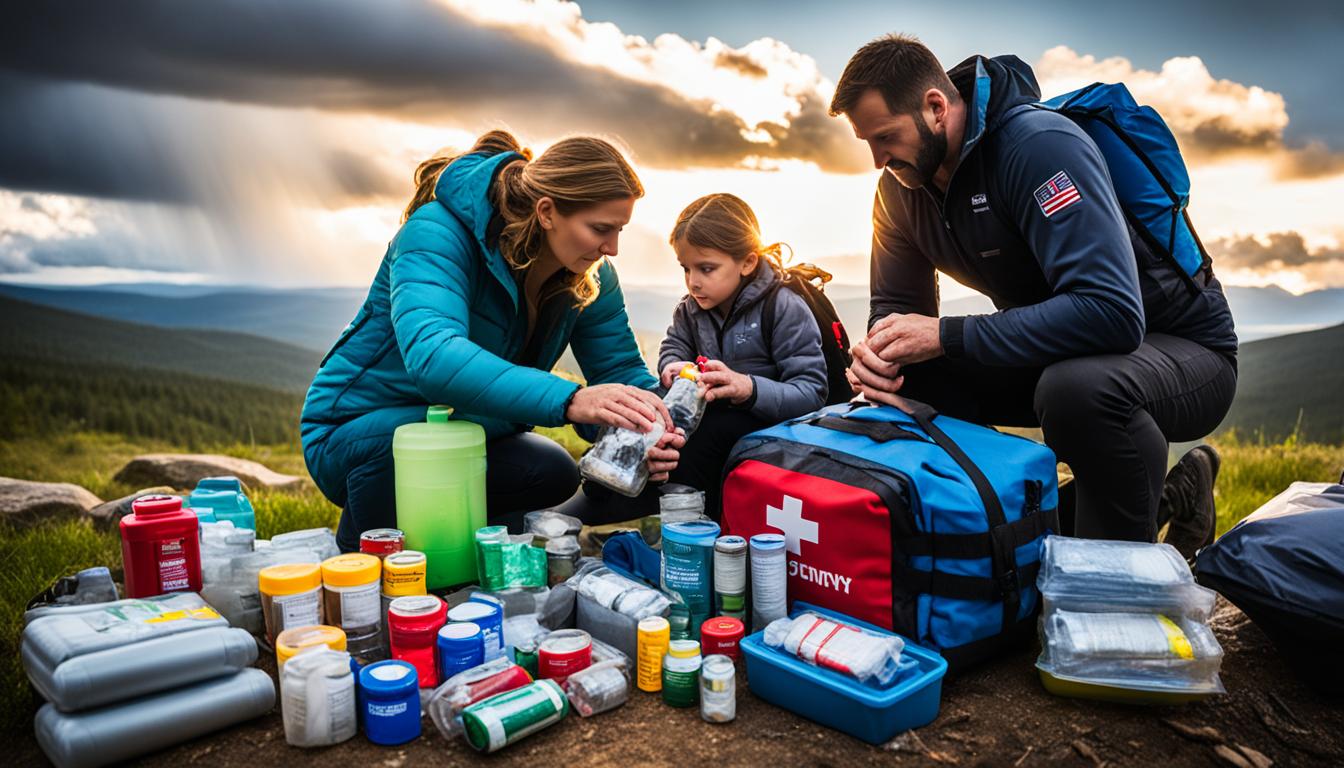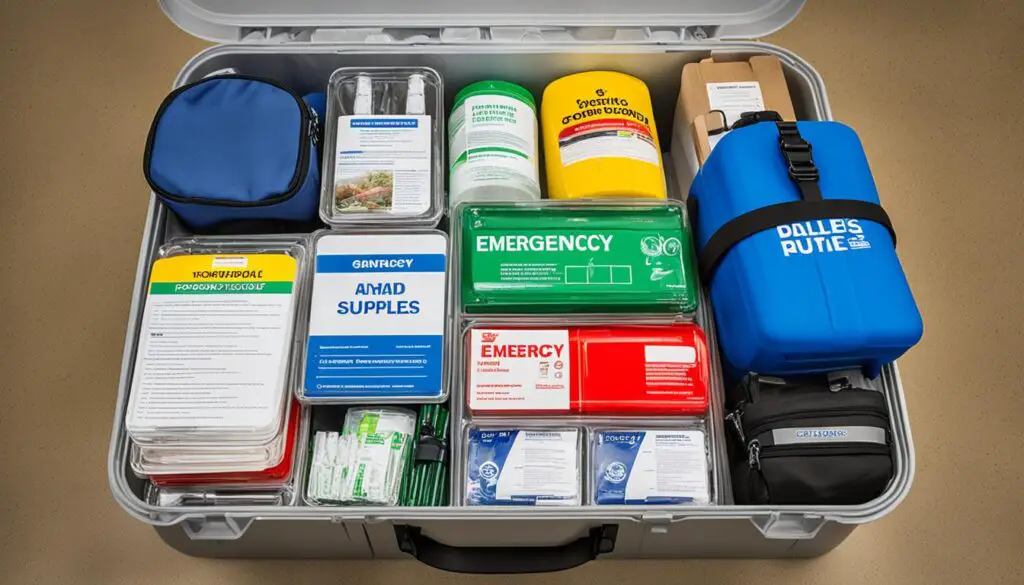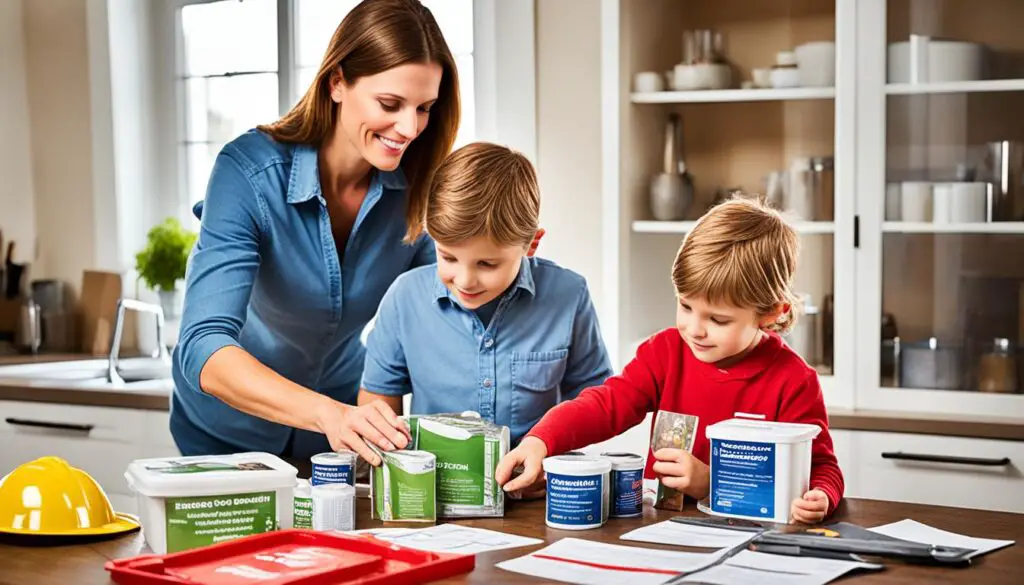
Family Emergency Preparedness: Planning for the Unexpected
Severe weather conditions can strike at any time, leaving families vulnerable and unprepared. Power outages, natural disasters, and other unexpected situations can pose significant safety risks to our loved ones. That’s why it is of utmost importance to have a solid plan in place for family emergency preparedness. By taking proactive steps to ensure the safety and well-being of our family members, we can navigate through challenging times with confidence.
Key Takeaways:
- Family emergency preparedness is crucial for ensuring the safety of our loved ones during unexpected situations.
- Develop an emergency preparedness plan that includes communication strategies, emergency contacts, and evacuation procedures.
- Stock up on essential supplies like non-perishable food, water, flashlights, and batteries to sustain your family in times of crisis.
- Regularly inspect your home for potential hazards and install smoke detectors and carbon monoxide detectors for added safety.
- Knowing basic first aid techniques and how to access emergency services can be life-saving in critical situations.
By prioritizing family emergency preparedness, we can safeguard the well-being of our loved ones and face unexpected situations with resilience. Let’s take the necessary steps today to plan for the unexpected and protect what matters most.
Creating an Emergency Preparedness Plan
First and foremost, it is crucial to have an emergency preparedness plan in place for your family. This plan should include important information for communication and emergency contacts.
“In times of crisis, effective communication is key to ensuring the safety of your loved ones.” – Dr. Rachel Anderson, Emergency Preparedness Expert
Make sure all family members are aware of the designated emergency contacts and how to reach them in case of an emergency. It is recommended to have multiple contacts in case one is unreachable. Store these numbers in your phones as well as on paper in a readily accessible location.
In addition to emergency contacts, establish a designated meeting place in case you are separated during an emergency. This can be a familiar landmark or a nearby community center. Ensure that all family members know the exact location and have a plan to get there safely.
Developing an Evacuation Plan
An important aspect of your emergency preparedness plan is to develop an evacuation plan. This plan should outline the steps to take in the event of a natural disaster or other emergency that requires you to leave your home.
Identify safe evacuation routes from your current location and have a backup route in case the primary route is blocked. Familiarize yourself with the evacuation procedures recommended by local authorities.
Discuss the evacuation plan with your family members and practice it regularly, so everyone knows what to do in an emergency. Assign specific tasks to each family member to ensure a smooth and organized evacuation.
Stocking Essential Supplies
Another critical aspect of emergency preparedness is to stock up on essential supplies. In case of a disaster or emergency, having necessary items readily available can make a significant difference in your safety and well-being.
Here are some essential supplies to include in your emergency kit:
- Non-perishable food items
- Bottled water
- Flashlights
- Batteries
- First aid kit
- Extra medication
- Blankets
- Personal hygiene items
Remember to regularly check and replenish your emergency supply kit to ensure it is well-stocked and up-to-date. Consider storing the supplies in a portable container or backpack for easy transport during an evacuation.

Ensuring Home Safety
When it comes to emergency preparedness, it is important to not only plan for unexpected situations but also take proactive measures to ensure the safety of your home. By addressing potential hazards, implementing fire safety measures, and being prepared to provide first aid, you can significantly reduce the risks to your family and property.
Inspecting Your Home
Regularly inspecting your home for potential hazards is essential for maintaining a safe living environment. Take the time to identify and address any issues that could pose a threat to your family’s safety.
- Check electrical systems, outlets, and cords for any signs of wear or damage.
- Ensure that your home has working smoke detectors and carbon monoxide detectors. Test them regularly to ensure they are functioning properly.
- Inspect your home for any potential fire hazards, such as flammable materials or clutter near heat sources.
- Keep your emergency exits clear of obstacles to ensure easy and quick evacuation if needed.
Fire Safety Measures
Fire safety should be a top priority in every home. Taking preventative measures and being prepared can mean the difference between a small incident and a devastating fire.
- Install fire extinguishers in key areas of your home, such as the kitchen and garage. Make sure everyone in your family knows how to use them effectively.
- Create a fire escape plan for your home. Identify multiple exits and practice emergency drills regularly with your family.
- Teach your family members about fire safety and proper procedures, including stop, drop, and roll in case their clothing catches fire.
- Consider installing a fire sprinkler system for added protection, especially in high-risk areas such as the kitchen.
First Aid Preparedness
Accidents and injuries can happen at any time, so it is crucial to have a well-stocked first aid kit and knowledge of basic first aid techniques.
- Ensure that your first aid kit is kept in a central location in your home and is easily accessible in case of an emergency.
- Regularly check and replenish your first aid supplies, including bandages, disinfectant, gauze, and adhesive tape.
- Consider taking a first aid course to learn essential life-saving techniques, such as CPR and the Heimlich maneuver. Knowing how to administer first aid can make a significant difference in emergency situations.
Accessing Emergency Services
In critical situations, knowing how to access emergency services and when to call 911 can be life-saving. It is important to familiarize yourself and your family with the necessary steps to take during an emergency.
- Keep a list of emergency phone numbers, including local police, fire department, and poison control, in a visible location.
- Teach your children how to call 911 and when it is appropriate to do so.
By prioritizing home safety, implementing fire safety measures, and being prepared to provide first aid, you are taking significant steps towards ensuring the well-being of your family. Remember, emergencies can happen at any time, so being proactive and prepared is key.

Conclusion
Family emergency preparedness plays a vital role in ensuring the safety and well-being of your loved ones during unexpected situations. By creating a comprehensive emergency preparedness plan, including effective communication and evacuation strategies, and stocking up on essential supplies, you can greatly enhance your readiness for emergencies. Additionally, taking proactive measures to ensure home safety, such as installing reliable smoke detectors and acquiring basic first aid knowledge, further bolsters the protection of your family.
By prioritizing family emergency preparedness, you gain peace of mind, knowing that you are prepared to face the unexpected. The unpredictability of emergencies makes it imperative to have a well-thought-out plan in place, enabling you to respond swiftly and efficiently. Regularly reviewing and rehearsing your preparedness plan with all family members is crucial to ensure everyone understands their roles and responsibilities.
In addition to the preparedness plan, your home must be a safe haven. Inspecting your living space for potential hazards, installing and maintaining reliable safety equipment, and being trained in first aid techniques are crucial steps in creating a secure environment. Understanding when to contact emergency services, such as dialing 911, can make a significant difference in critical situations.
Remember, family emergency preparedness is an ongoing endeavor. Continually updating and replenishing your emergency supply kit, keeping emergency contacts updated, and staying informed about potential hazards in your area are essential components of your preparedness efforts. By investing the time and effort in family emergency preparedness and implementing effective safety measures, you can safeguard your loved ones’ well-being and navigate through unforeseen circumstances with confidence.
FAQ
Why is family emergency preparedness important?
Family emergency preparedness is important because it ensures the safety and well-being of your loved ones during unexpected situations. It allows you to have a plan in place and the necessary emergency contacts to communicate and take action effectively.
What should be included in an emergency preparedness plan?
An emergency preparedness plan should include important information for communication and emergency contacts. It should also establish a meeting place in case family members are separated and outline the steps to take in the event of a natural disaster or other emergency. Additionally, it should include a well-stocked supply kit with essential items such as non-perishable food, water, flashlights, and batteries.
How can I ensure the safety of my home during emergencies?
To ensure the safety of your home during emergencies, regularly inspect your home for potential hazards and address any issues promptly. Install and regularly test smoke detectors and carbon monoxide detectors. Familiarize yourself with the location of emergency exits and ensure they are easily accessible. Have a well-stocked first aid kit and be trained in basic first aid techniques. Know how to access emergency services and when to call 911.
How can family emergency preparedness provide peace of mind?
By prioritizing family emergency preparedness, you can have peace of mind knowing that you are prepared for the unexpected. Having an emergency preparedness plan, including communication and evacuation strategies, and stocking up on essential supplies, can give you confidence in your ability to protect your loved ones and navigate emergencies effectively. Ensuring home safety measures further adds to this peace of mind.